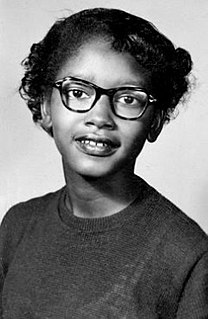Top 38 Quotes & Sayings by Claudette Colvin
Explore popular quotes and sayings by an American activist Claudette Colvin.
Last updated on April 14, 2025.
Back then, as a teenager, I kept thinking, why don't the adults around here just say something? Say it so they know we don't accept segregation? I knew then and I know now that, when it comes to justice, there's no easy way to get it. You can't sugarcoat it. You have to take a stand and say, 'This is not right.'
Whenever people ask me: 'Why didn't you get up when the bus driver asked you?' I say it felt as though Harriet Tubman's hands were pushing me down on one shoulder and Sojourner Truth's hands were pushing me down on the other shoulder. I felt inspired by these women because my teacher taught us about them in so much detail.
Back then, as a teenager, I kept thinking, Why don't the adult around here just say something? Say it so they know we don't accept segregation? I knew then and I know now that, when it comes to justice, there is no easy way to get it. You can't sugarcoat it. You have to take a stand and say, 'This is not right.' And I did.






















